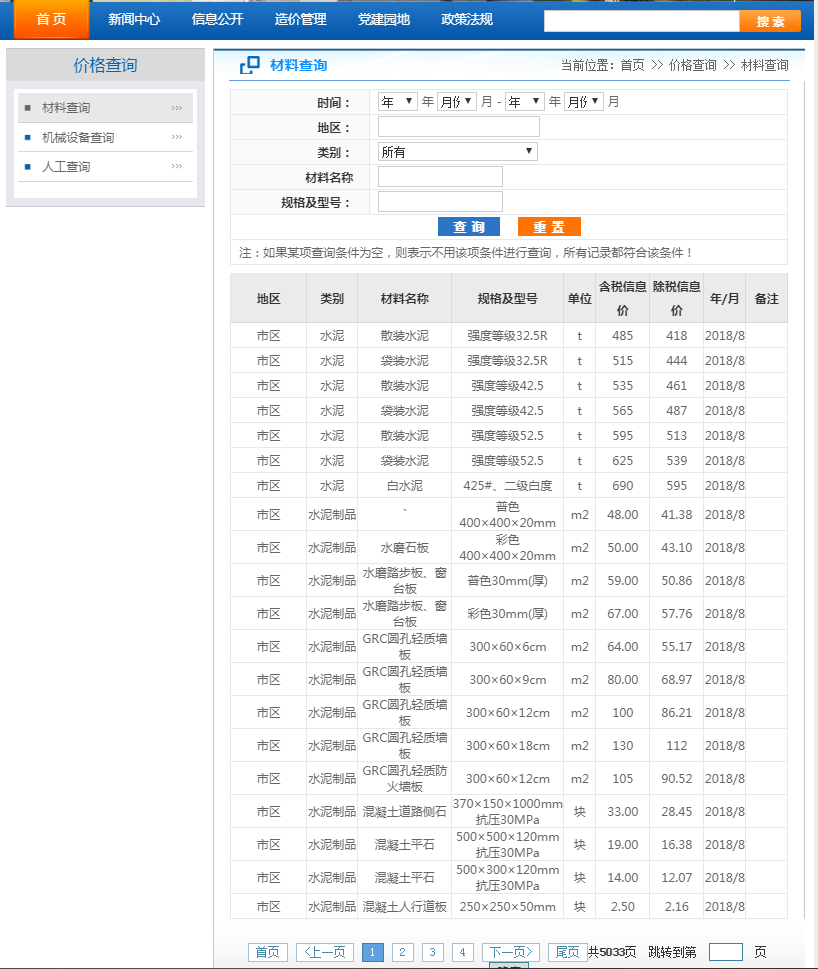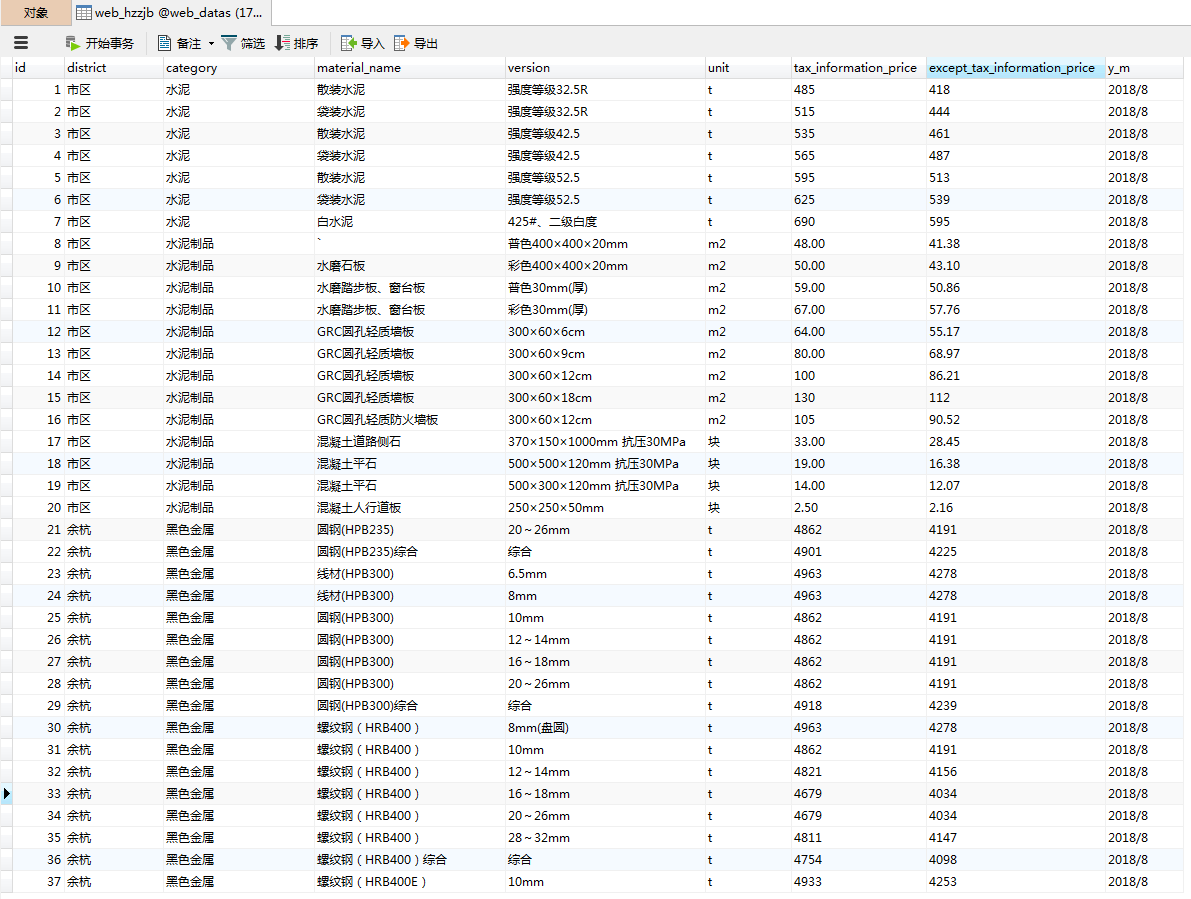这几天一直都再用scrapy写网站数据采集的爬虫,这里我就选一个写过的爬虫来记录一下。
杭州造价网:http://183.129.219.195:8081/bs/hzzjb/web/list
这里出现的主要问题就是:
1.
这里我的代码会出现一些问题,内存溢出,由于程序一直在运行,内存一直在增加(未释放内存,有待改进),就会导致爬虫程序假死等待。
2.
yield scrapy.FormRequest(url='http://183.129.219.195:8081/bs/hzzjb/web/list', callback=self.parse, formdata=data, method="POST", dont_filter=True)
dont_filter 默认设置False 导致 去重过滤,未能获取下一页链接。
3.
还有一个问题就是最后一页的数据我没解决,我拿了5032页,这个翻页还是没完善好。
网站主要信息:

hzzjb.py
# -*- coding: utf-8 -*-
import scrapy
import json
import re
from hzzjb_web.items import HzzjbWebItem
class HzzjbSpider(scrapy.Spider):
name = 'hzzjb'
allowed_domains = ['183.129.219.195:8081/bs']
start_urls = ['http://183.129.219.195:8081/bs/hzzjb/web/list']
custom_settings = {
"DOWNLOAD_DELAY": 1,
"ITEM_PIPELINES": {
'hzzjb_web.pipelines.MysqlPipeline': 320,
},
"DOWNLOADER_MIDDLEWARES": {
'hzzjb_web.middlewares.HzzjbWebDownloaderMiddleware': 500
},
}
def parse(self, response):
_response=response.text
# print(_response)
try :
#获取信息表
tag_list=response.xpath("//table[@class='table1']//tr/td").extract()
# print(tag_list)
# for i in tag_list:
# print(i)
tag1=tag_list[:9]
tag2=tag_list[9:18]
tag3=tag_list[18:27]
tag4=tag_list[27:36]
tag5=tag_list[36:45]
tag6=tag_list[45:54]
tag7=tag_list[54:63]
tag8=tag_list[63:72]
tag9=tag_list[72:81]
tag10=tag_list[81:90]
tag11=tag_list[90:99]
tag12=tag_list[99:108]
tag13=tag_list[108:117]
tag14=tag_list[117:126]
tag15=tag_list[126:135]
tag16=tag_list[135:144]
tag17=tag_list[144:153]
tag18=tag_list[153:162]
tag19=tag_list[162:171]
tag20=tag_list[171:180]
list=[]
list.append(tag1)
list.append(tag2)
list.append(tag3)
list.append(tag4)
list.append(tag5)
list.append(tag6)
list.append(tag7)
list.append(tag8)
list.append(tag9)
list.append(tag10)
list.append(tag11)
list.append(tag12)
list.append(tag13)
list.append(tag14)
list.append(tag15)
list.append(tag16)
list.append(tag17)
list.append(tag18)
list.append(tag19)
list.append(tag20)
# print(list)
except:
print('————————————————网站编码有异常!————————————————————')
for index,tag in enumerate(list):
# print('*'*100)
# print(index+1,TAG(i))
item = HzzjbWebItem()
# 地区
district = tag[0].replace('<td>','').replace('</td>','')
# print(district)
item['district'] = district
# 类别
category = tag[1].replace('<td>','').replace('</td>','')
# print(category)
item['category'] = category
# 材料名称
material_name = tag[2].replace('<td>','').replace('</td>','')
# print(material_name)
item['material_name'] = material_name
# 规格及型号
version = tag[3].replace('<td>','').replace('</td>','')
# print(version)
item['version'] = version
# 单位
unit = tag[4].replace('<td>','').replace('</td>','')
# print(unit)
item['unit'] = unit
# 含税信息价
tax_information_price = tag[5].replace('<td>','').replace('</td>','')
# print(tax_information_price)
item['tax_information_price'] = tax_information_price
# 除税信息价
except_tax_information_price = tag[6].replace('<td>','').replace('</td>','')
# print(except_tax_information_price)
item['except_tax_information_price'] = except_tax_information_price
# 年/月
year_month = tag[7].replace('<td>','').replace('</td>','')
# print(year_month)
item['y_m'] = year_month
# print('*'*100)
yield item
for i in range(2, 5032):
# 翻页
data={
'mtype': '2',
'_query.nfStart':'',
'_query.yfStart':'',
'_query.nfEnd':'',
'_query.yfEnd':'',
'_query.dqstr':'',
'_query.dq':'',
'_query.lbtype':'',
'_query.clmc':'',
'_query.ggjxh':'',
'pageNumber': '{}'.format(i),
'pageSize':'',
'orderColunm':'',
'orderMode':'',
}
yield scrapy.FormRequest(url='http://183.129.219.195:8081/bs/hzzjb/web/list', callback=self.parse, formdata=data, method="POST", dont_filter=True)
items.py
# -*- coding: utf-8 -*-
# Define here the models for your scraped items
#
# See documentation in:
# https://doc.scrapy.org/en/latest/topics/items.html
import scrapy
class HzzjbWebItem(scrapy.Item):
# define the fields for your item here like:
# name = scrapy.Field()
district=scrapy.Field()
category=scrapy.Field()
material_name=scrapy.Field()
version=scrapy.Field()
unit=scrapy.Field()
tax_information_price=scrapy.Field()
except_tax_information_price=scrapy.Field()
y_m=scrapy.Field()
middlewares.py
# -*- coding: utf-8 -*-
# Define here the models for your spider middleware
#
# See documentation in:
# https://doc.scrapy.org/en/latest/topics/spider-middleware.html
from scrapy import signals
class HzzjbWebSpiderMiddleware(object):
# Not all methods need to be defined. If a method is not defined,
# scrapy acts as if the spider middleware does not modify the
# passed objects.
@classmethod
def from_crawler(cls, crawler):
# This method is used by Scrapy to create your spiders.
s = cls()
crawler.signals.connect(s.spider_opened, signal=signals.spider_opened)
return s
def process_spider_input(self, response, spider):
# Called for each response that goes through the spider
# middleware and into the spider.
# Should return None or raise an exception.
return None
def process_spider_output(self, response, result, spider):
# Called with the results returned from the Spider, after
# it has processed the response.
# Must return an iterable of Request, dict or Item objects.
for i in result:
yield i
def process_spider_exception(self, response, exception, spider):
# Called when a spider or process_spider_input() method
# (from other spider middleware) raises an exception.
# Should return either None or an iterable of Response, dict
# or Item objects.
pass
def process_start_requests(self, start_requests, spider):
# Called with the start requests of the spider, and works
# similarly to the process_spider_output() method, except
# that it doesn’t have a response associated.
# Must return only requests (not items).
for r in start_requests:
yield r
def spider_opened(self, spider):
spider.logger.info('Spider opened: %s' % spider.name)
class HzzjbWebDownloaderMiddleware(object):
# Not all methods need to be defined. If a method is not defined,
# scrapy acts as if the downloader middleware does not modify the
# passed objects.
@classmethod
def from_crawler(cls, crawler):
# This method is used by Scrapy to create your spiders.
s = cls()
crawler.signals.connect(s.spider_opened, signal=signals.spider_opened)
return s
def process_request(self, request, spider):
# Called for each request that goes through the downloader
# middleware.
# Must either:
# - return None: continue processing this request
# - or return a Response object
# - or return a Request object
# - or raise IgnoreRequest: process_exception() methods of
# installed downloader middleware will be called
return None
def process_response(self, request, response, spider):
# Called with the response returned from the downloader.
# Must either;
# - return a Response object
# - return a Request object
# - or raise IgnoreRequest
return response
def process_exception(self, request, exception, spider):
# Called when a download handler or a process_request()
# (from other downloader middleware) raises an exception.
# Must either:
# - return None: continue processing this exception
# - return a Response object: stops process_exception() chain
# - return a Request object: stops process_exception() chain
pass
def spider_opened(self, spider):
spider.logger.info('Spider opened: %s' % spider.name)
piplines.py
# -*- coding: utf-8 -*-
# Define your item pipelines here
#
# Don't forget to add your pipeline to the ITEM_PIPELINES setting
# See: https://doc.scrapy.org/en/latest/topics/item-pipeline.html
from scrapy.conf import settings
import pymysql
class HzzjbWebPipeline(object):
def process_item(self, item, spider):
return item
# 数据保存mysql
class MysqlPipeline(object):
def open_spider(self, spider):
self.host = settings.get('MYSQL_HOST')
self.port = settings.get('MYSQL_PORT')
self.user = settings.get('MYSQL_USER')
self.password = settings.get('MYSQL_PASSWORD')
self.db = settings.get(('MYSQL_DB'))
self.table = settings.get('TABLE')
self.client = pymysql.connect(host=self.host, user=self.user, password=self.password, port=self.port, db=self.db, charset='utf8')
def process_item(self, item, spider):
item_dict = dict(item)
cursor = self.client.cursor()
values = ','.join(['%s'] * len(item_dict))
keys = ','.join(item_dict.keys())
sql = 'INSERT INTO {table}({keys}) VALUES ({values})'.format(table=self.table, keys=keys, values=values)
try:
if cursor.execute(sql, tuple(item_dict.values())): # 第一个值为sql语句第二个为 值 为一个元组
print('数据入库成功!')
self.client.commit()
except Exception as e:
print(e)
print('数据已存在!')
self.client.rollback()
return item
def close_spider(self, spider):
self.client.close()
setting.py
# -*- coding: utf-8 -*-
# Scrapy settings for hzzjb_web project
#
# For simplicity, this file contains only settings considered important or
# commonly used. You can find more settings consulting the documentation:
#
# https://doc.scrapy.org/en/latest/topics/settings.html
# https://doc.scrapy.org/en/latest/topics/downloader-middleware.html
# https://doc.scrapy.org/en/latest/topics/spider-middleware.html
BOT_NAME = 'hzzjb_web'
SPIDER_MODULES = ['hzzjb_web.spiders']
NEWSPIDER_MODULE = 'hzzjb_web.spiders'
# mysql配置参数
MYSQL_HOST = "172.16.10.197"
MYSQL_PORT = 3306
MYSQL_USER = "root"
MYSQL_PASSWORD = "123456"
MYSQL_DB = 'web_datas'
TABLE = "web_hzzjb"
# Crawl responsibly by identifying yourself (and your website) on the user-agent
#USER_AGENT = 'hzzjb_web (+http://www.yourdomain.com)'
# Obey robots.txt rules
ROBOTSTXT_OBEY = False
# Configure maximum concurrent requests performed by Scrapy (default: 16)
#CONCURRENT_REQUESTS = 32
# Configure a delay for requests for the same website (default: 0)
# See https://doc.scrapy.org/en/latest/topics/settings.html#download-delay
# See also autothrottle settings and docs
#DOWNLOAD_DELAY = 3
# The download delay setting will honor only one of:
#CONCURRENT_REQUESTS_PER_DOMAIN = 16
#CONCURRENT_REQUESTS_PER_IP = 16
# Disable cookies (enabled by default)
#COOKIES_ENABLED = False
# Disable Telnet Console (enabled by default)
#TELNETCONSOLE_ENABLED = False
# Override the default request headers:
#DEFAULT_REQUEST_HEADERS = {
# 'Accept': 'text/html,application/xhtml+xml,application/xml;q=0.9,*/*;q=0.8',
# 'Accept-Language': 'en',
#}
# Enable or disable spider middlewares
# See https://doc.scrapy.org/en/latest/topics/spider-middleware.html
#SPIDER_MIDDLEWARES = {
# 'hzzjb_web.middlewares.HzzjbWebSpiderMiddleware': 543,
#}
# Enable or disable downloader middlewares
# See https://doc.scrapy.org/en/latest/topics/downloader-middleware.html
DOWNLOADER_MIDDLEWARES = {
'hzzjb_web.middlewares.HzzjbWebDownloaderMiddleware': 500,
}
# Enable or disable extensions
# See https://doc.scrapy.org/en/latest/topics/extensions.html
#EXTENSIONS = {
# 'scrapy.extensions.telnet.TelnetConsole': None,
#}
# Configure item pipelines
# See https://doc.scrapy.org/en/latest/topics/item-pipeline.html
ITEM_PIPELINES = {
'hzzjb_web.pipelines.HzzjbWebPipeline': 300,
}
# Enable and configure the AutoThrottle extension (disabled by default)
# See https://doc.scrapy.org/en/latest/topics/autothrottle.html
#AUTOTHROTTLE_ENABLED = True
# The initial download delay
#AUTOTHROTTLE_START_DELAY = 5
# The maximum download delay to be set in case of high latencies
#AUTOTHROTTLE_MAX_DELAY = 60
# The average number of requests Scrapy should be sending in parallel to
# each remote server
#AUTOTHROTTLE_TARGET_CONCURRENCY = 1.0
# Enable showing throttling stats for every response received:
#AUTOTHROTTLE_DEBUG = False
# Enable and configure HTTP caching (disabled by default)
# See https://doc.scrapy.org/en/latest/topics/downloader-middleware.html#httpcache-middleware-settings
#HTTPCACHE_ENABLED = True
#HTTPCACHE_EXPIRATION_SECS = 0
#HTTPCACHE_DIR = 'httpcache'
#HTTPCACHE_IGNORE_HTTP_CODES = []
#HTTPCACHE_STORAGE = 'scrapy.extensions.httpcache.FilesystemCacheStorage'
执行文件 :scrapy crawl hzzjb -s JOBDIR=myspider 设置持久化
就会生成如下文件:

数据入库如图:



